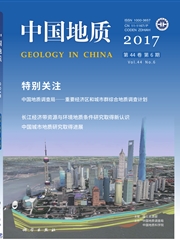

 中文摘要:
中文摘要:
汤家坪大型斑岩型钼矿床位于大别造山带。对流体包裹体的岩相学、显微测温及激光拉曼显微探针分析表明,汤家坪钼矿床的流体包裹体可划分为富(含)CO2包裹体、水溶液包裹体和含子晶包裹体3类;均~温度集中在126,7-472.1℃,盐度集中在(0.18-14.21)wt%和(33.10~54.37)wt%.密度为O.38~1.21g/cm^3;子矿物含石盐及金属硫化物等。从矿体中心向外围.流体包裹体的温度、盐度有逐渐变小的趋势;从成矿早阶段到晚阶段.由高盐度低密度岩浆流体逐渐变为低盐度低密度流体,压力逐渐变小,深度变浅。辉钥矿的Re-Os模式年龄集巾在113~118Ma.表明成矿略晚于母岩岩体的成岩时代.其成岩成矿的构造背景为华北与扬子板块碰撞造山晚期的伸展构造体制。
 英文摘要:
英文摘要:
The Tangjiaping Mo deposit in Henan Province is located in the Dabie orogenic belt. In quartz three types of fluid inclusions can be observed, namely CO2-rich (bearing) fluid inclusions, aqueous solution fluid inclusions and daughter-crystal-bearing fluid inclusions, based on the petrography, microthermometric measurement and Laser Raman microprobe analysis. The homogenization temperatures vary from 126.7℃ to 472.1℃, the calculated fluid salinities cluster in two ranges, i.e., (0.18-14.21) wt% NaCl.eqv and (33.10-54.37) wt% NaCl.eqv, with densities changing from 0.38 to 1.21 g/cm^3. Daughter minerals, mainly halite and metallic sulfide, can be recognized in fluid inclusions. The homogenization temperature and salinity of fluid inclusions reduce gradually outward from the center of ore-forming porphyry system. From early to late the fluid system evolved from and high temperature and high salinity to low temperature, and low salinity; and the trapped pressure reduced, indicating the mineralization depth became shallower gently. The Re-Os isotopic model ages of molybdenite are between 113 Ma and 118 Ma, about 10 Ma later than the crystalline age of the Tangjiaping granite porphyry. The ore-system was formed in waning stage extension setting of the inter-continental collision between Yangtze Block and North China Block.
 同期刊论文项目
同期刊论文项目
 同项目期刊论文
同项目期刊论文
 期刊信息
期刊信息
